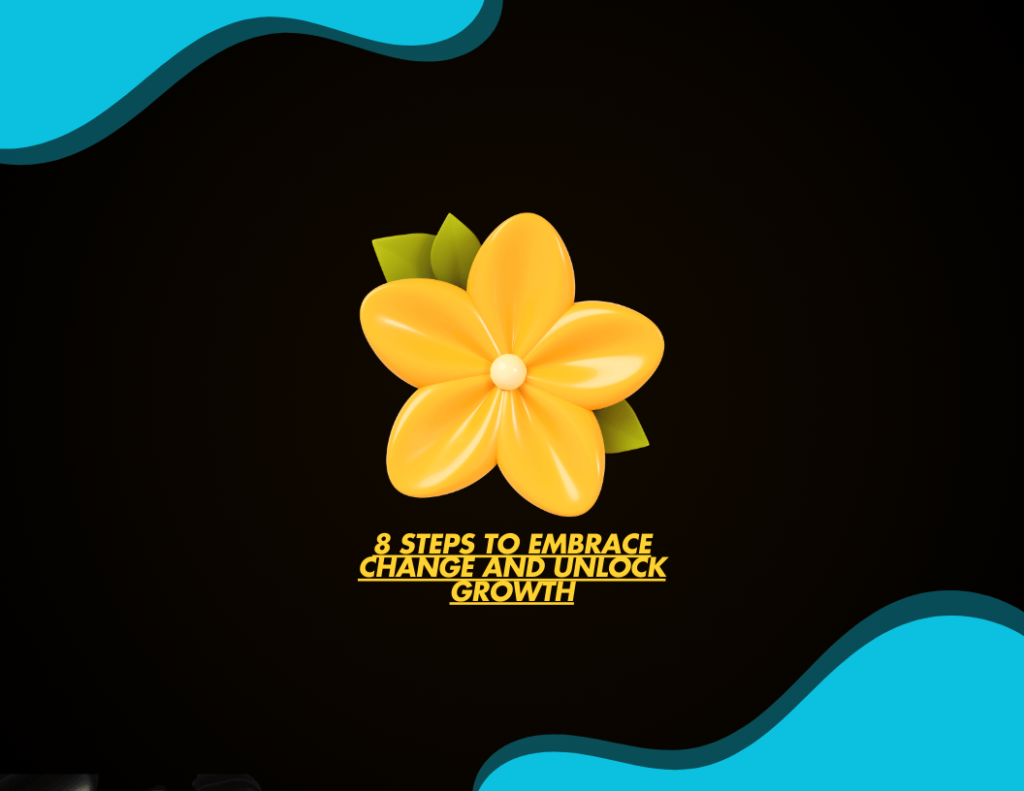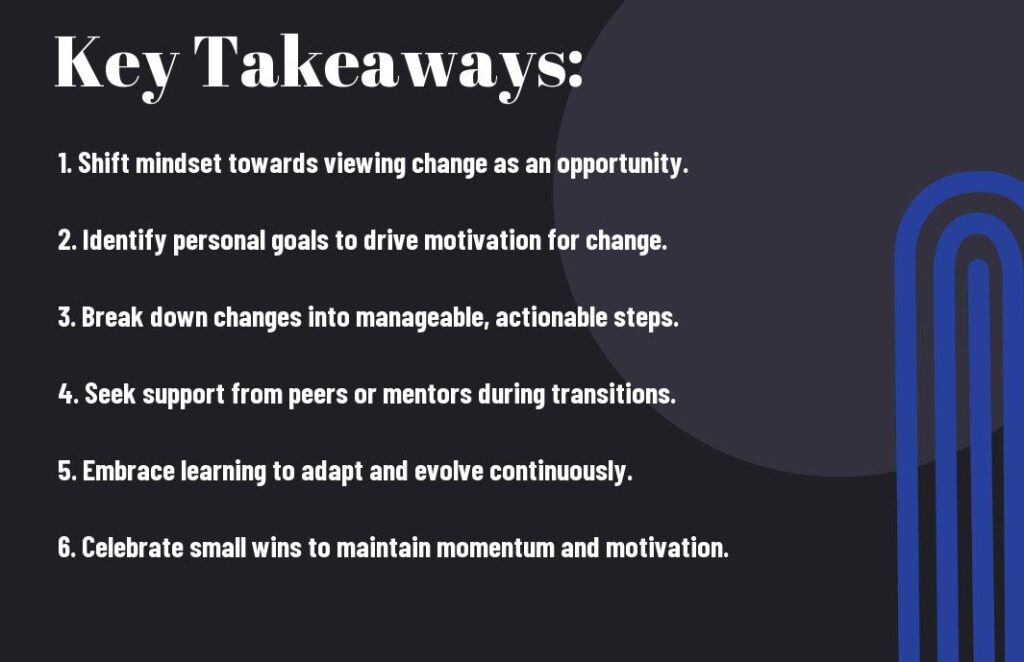8 Steps to Embrace Change and Unlock Growth
Just as the seasons change, so too must you adapt to the evolving landscape of your life and career. Embracing change can lead to remarkable growth and opportunities that you may not have otherwise encountered. However, navigating change can also be daunting and filled with challenges. In this blog post, you will discover eight vital steps that will empower you to not only accept change but also leverage it to unlock your full potential. Get ready to transform your mindset and foster a culture of resilience and adaptability!

Understanding the Nature of Change
For many, change can feel daunting and overwhelming, yet it is an inevitable part of life. By embracing the nature of change, you can unlock new opportunities and foster personal growth. Understanding that change is a constant force allows you to navigate your journey with resilience and adaptability. Recognizing that each transition presents a chance for development will empower you to face challenges head-on, ultimately leading to a more fulfilling life.
The Psychology of Change
One of the key aspects of change is understanding its psychological impact. People often experience a natural resistance to change due to fear of the unknown or attachment to the familiar. Acknowledging these feelings can help you gain clarity and choose a proactive approach to navigate transitions with a positive mindset.
Common Barriers to Embracing Change
At times, you may find yourself hindered by common barriers that obstruct your acceptance of change. These barriers might include fear of failure, lack of confidence, or rigid routines that create a false sense of security. Identifying these obstacles is the first step towards overcoming them.
To effectively embrace change, it’s vital to confront and dismantle these barriers head-on. Fear of failure can paralyze you, leading to missed opportunities; however, viewing failure as a learning opportunity can shift your perspective. Similarly, if your confidence wavers, surrounding yourself with a supportive community can help bolster your self-esteem. Additionally, breaking free from rigid routines and experimenting with small changes can lead to greater adaptability. By actively working to eliminate these barriers, you create a more flexible mindset that welcomes growth.


Cultivating a Growth Mindset
Any individual seeking to embrace change and unlock growth must cultivate a growth mindset, which emphasizes the belief that abilities and intelligence can be developed over time. By viewing challenges as opportunities for learning and improvement, you allow yourself to adapt and thrive even in uncertain situations, transforming setbacks into stepping stones for future success.
The Power of Positive Thinking
Around you is a world filled with possibilities, and your mindset heavily influences how you perceive and react to these opportunities. By fostering positive thinking, you can shift your focus from limitations to potential, enabling you to tackle obstacles with enthusiasm and resilience. This optimistic outlook not only enhances your confidence but also draws in new experiences and connections which support your growth journey.
Overcoming Fear of Failure
Overcoming your fear of failure is vital to unlocking your full potential. Rather than shying away from challenges, embracing them as learning experiences can transform your journey. You must understand that every setback is a stepping stone, equipping you with lessons that shape your success.
Growth is often stunted by the fear of failure, but by tackling this apprehension head-on, you can unlock your true potential. Face your fears and accept the possibility of failure as a part of the learning process. Each time you step out of your comfort zone, you build resilience, broadening your experiences and enhancing your skill set. Embrace the opportunities that come with risks, knowing that every failure brings you one step closer to success. Your ability to bounce back will define your journey, allowing you to thrive in the face of adversity and motivate others along the way.
Setting Clear Goals for Change
Despite the uncertainty that comes with change, setting clear goals provides a strong foundation for your journey. Goals will serve as your roadmap, guiding your efforts and helping you maintain focus. By articulating specific objectives, you can measure progress, adjust as needed, and ultimately stay motivated as you embrace change and pursue growth.
Defining Your Vision
Along with setting goals, defining your vision is imperative for clarity in your change process. Your vision should encapsulate what you want to achieve and the values that drive you. By having a clear picture of your desired outcome, you can align your goals and actions with your core beliefs, ensuring that every effort resonates with your overall purpose.
Creating an Actionable Plan
With a solid vision in place, creating an actionable plan is the next step to ensure your goals are attainable. Your plan should outline specific tasks, timelines, and resources needed to achieve your objectives. Breaking larger goals into manageable, bite-sized actions makes the process less overwhelming and allows for consistent progress.
Actionable plans are vital for turning intentions into reality. They help you establish clear steps and set deadlines to hold yourself accountable. Ensure your plan includes measurable milestones to track progress, enabling you to adjust your approach if necessary. Take advantage of available resources and support; this will enhance your strategy and bolster your confidence. Most importantly, stay flexible and adapt to challenges that may arise, continually refining your approach as you work toward your goals. This preparedness will empower you to embrace change and seize the opportunities it presents.
Building a Support System
Unlike facing change alone, building a support system can significantly enhance your journey toward growth. Surrounding yourself with those who share your aspirations and values provides the encouragement you need. This collective energy nurtures ideas and fosters resilience, making it easier to navigate the challenges of change and achieve your goals.
The Role of Mentorship
On your path to growth, mentorship plays an invaluable role, offering guidance and wisdom from those who have already journeyed through similar changes. A mentor can provide you with insights, feedback, and encouragement, making it easier for you to embrace new challenges and pursue your aspirations with confidence.
Engaging with Like-minded Individuals
Beside seeking mentorship, engaging with like-minded individuals can provide you with camaraderie and support as you navigate change. Connecting with others who share your goals creates a sense of belonging and motivation.
Further, engaging with like-minded individuals opens doors to new perspectives and ideas. When you surround yourself with those who resonate with your ambitions, you create an environment conducive to creativity and collaboration. This exchange of thoughts and experiences energizes you and promotes personal and communal growth. Additionally, it can serve as a buffer against negativity and doubt, allowing you to remain focused and inspired. By sharing struggles and celebrating achievements together, you foster a community that uplifts and empowers each member to thrive amidst change.
Learning to Adapt
Now, adapting to change is vital for personal and professional growth. You must cultivate a mindset that embraces new ideas and perspectives. By understanding that change is not an obstacle but an opportunity, you position yourself to thrive in unfamiliar environments. Adapting enables you to manage uncertainty and seize potential advantages that come with evolving situations, ensuring you stay relevant in an ever-changing landscape.
Flexibility in Approaches
Learning to be flexible in your approaches allows you to navigate challenges with ease. Embrace diverse strategies to tackle problems, rather than sticking to a rigid plan. By being open to experimenting with different methodologies, you not only enhance your problem-solving skills but also foster creativity and innovation in your endeavors.
Continuous Learning Strategies
After you accept the necessity of change, employing continuous learning strategies can significantly elevate your adaptability. Engaging in lifelong learning helps you continuously acquire skills and knowledge, allowing you to respond effectively to new trends and demands in your environment.
Indeed, implementing continuous learning strategies is paramount for sustaining growth in a rapidly evolving world. You might consider online courses, workshops, or even mentorship opportunities to constantly update your knowledge base. Actively seeking feedback is vital as it helps you identify areas for improvement and growth. By committing to this learning journey, you foster a growth mindset, allowing you to stay adaptable and resilient in the face of challenges. This approach not only enhances your skill set but also positions you to seize new opportunities that arise in your path.
Reflecting on Progress
Many individuals overlook the importance of periodically reflecting on their progress as they navigate change. Taking the time to assess your journey not only helps you celebrate achievements but also sheds light on areas needing improvement. This reflective practice enables you to gain valuable insights, reinforcing your commitment to growth and adapting your strategies as needed.
Evaluating Milestones
An effective way to reflect is by evaluating the milestones you’ve reached. Consider your short-term goals and how they connect to your long-term objectives. Assessing these milestones will provide clarity on your progress and ensure that you are on the right path.
Making Necessary Adjustments
Reflecting on your journey often reveals areas requiring adjustment.
In fact, not recognizing when alterations are needed can lead you to persist in ineffective strategies. To avoid stagnation, focus on the outcomes of your efforts; if something isn’t working, be proactive in making necessary changes. An adaptive mindset allows you to pivot, embracing new methods or techniques that could enhance your growth journey. By identifying both strengths and weaknesses during your reflection, you can better align your actions with your goals, thereby increasing your chances for future success.
To wrap up
Drawing together the insights from the 8 steps to embrace change and unlock growth, you can transform your approach to challenges and opportunities. By actively cultivating a mindset that welcomes adaptability, learning, and collaboration, you position yourself to thrive in an ever-evolving landscape. Each step empowers you to not only navigate change but to leverage it for your personal and professional development, ultimately enhancing your resilience and capacity for growth. Embrace the journey, and watch as new possibilities unfold before you.


